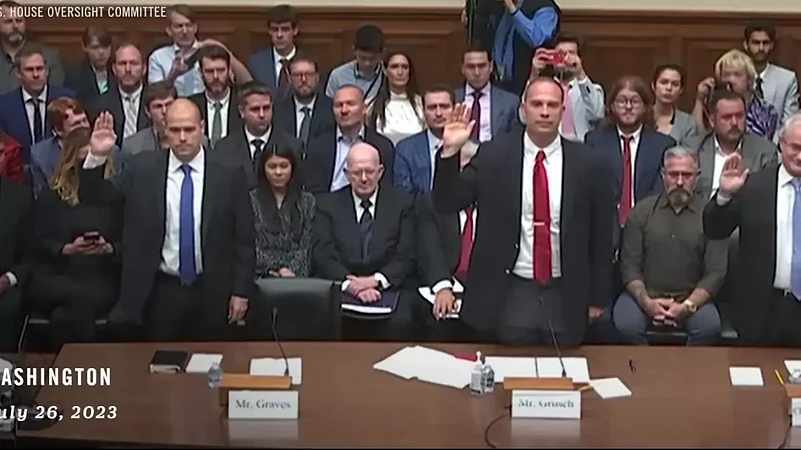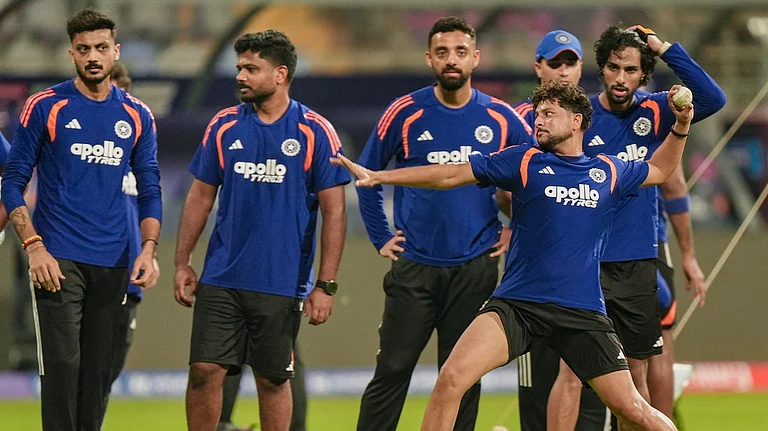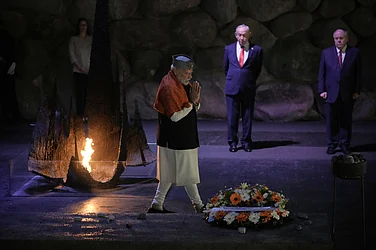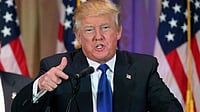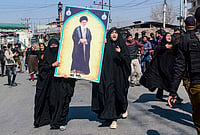Having long fascinated the popular imagination, culture and the realm of science fiction as well as conspiracy theories, UFOs have finally made their way to the realm of legislators. On Thursday, highly-anticipated whistleblower, and former intelligence official David Grusch gave searing testimony to a House Oversight Subcommittee on UFOs. He was supported by additional testimony from former Navy aviators, David Fravor and Ryan Graves who described encounters with unidentified aerial phenomena (UAPS) – more than a decade and a continent apart. The hearing made headlines around the world, and Outlook looks at some of the key takeaways from it.
The background to the highly anticipated hearing which happened at a chamber of the famous Rayburn House Office Building, which has seen many monumental hearings over the years, delves from recent efforts to put pressure on the Pentagon and other intelligence agencies to come clean about long-shrouded and shadowy programs into the investigation of UAPs. The two former Navy pilots first described their encounters to the New York Times in 2017 and 2018, which prompted calls for more governmental transparency on U.F.Os. It created pressure on the Pentagon and its Advanced Aerospace Threat Identification Program to collate reports across hundreds of sightings and investigations and answer for them. However, the government continued to keep most of its work under wraps. Until David Grusch.
Grusch, a former Air Force intelligence official who worked with the Pentagon Task Force looking into the UAPs (the official government reference to UFOs), testified under oath, that there were indeed longstanding programs to shelter "non-human biologic materials" recovered from crash sites and cover-up the scope and extent of the programs. Grusch was cross-questioned by lawmakers across party lines, from Democrat Alexandria Ocasio-Cortez of New York to Representative Tim Burchett, Republic of Tennessee. Burchett spoke about a "cover-up" that stretched far beyond partisan politics, and all the attention centred around Grusch.
When asked by Rep. Robert Garcia about whether he believed the government was in possession of UAPs, Grusch replied that absolutely. He added that this was based on 40 interviews with witnesses over four years, He added that he knows “the exact locations” of where this technology is “and those locations were provided to the inspector general and some of which, to the intelligence committees”.
However, Grusch further said that he was denied access to files and information concerning a multidecade UAP crash retrieval and reverse engineering program. This allegation was rejected roundly by the government through Pentagon spokeswoman Sue Gough who said that the Pentagon did not have any “verifiable information to substantiate claims that any programs regarding the possession or reverse-engineering of extraterrestrial materials have existed in the past or exist currently."
Grusch's coming forward has been met with pushback and stringent denial from the Pentagon and other intelligence agencies. When questioned by Rep. Tim Burchett about whether he had "personal knowledge of people" who had been harmed or injured in an effort to cover up, Grusch answered in the affirmative, and expanded on what he called "administrative terrorism", saying that he had received overwhelming support from colleagues" but spoke about how administrative terrorism seriously affected their careers.
"I call it administrative terrorism. That’s their quiver or tool in the toolbox to silence people, especially the career government servants who care about their career, care about their clearance, and their reputation, to climb the ladder. When you threaten that flow, that career path, a lot of people back off, but I’m here to represent those people."
Grusch also testified that he had heard of active reprisal plans underway against him. He was further questioned on whether anyone had been murdered in an effort to cover-up, and demurred here, saying that he could not speak about this in a public session". Sceptics noted that Grusch would choose to demur from other lines of questioning, responding to many questions with the answer that he could not talk about it in public hearings. They noted that the government hiding information on such programs was nothing new, and also that many of the claims that Grusch had put forward in his sensational NewsNation interview over a month ago, such as one where he referred to a "football field-sized" UAP in government possession, he refused to speak about while under oath.
However, in his own NewsNation interview, while Grusch confirmed the scale and shadowy size of the government task forces looking into the matter, he himself said he was reluctant to use the term, "alien life".
Grusch's testimony was backed up by strong additional testimony from Navy pilots Fravor and Graves who had inspired the renewed interest in governmental accountability on UAP programs. Fravor was the pilot who filmed the famous “Tic Tac” video while on a routine training mission with the aircraft carrier USS Nimitz off the southern California coast in November 2004. Observers noted that the Tic Tac video was the hardest for the government to explain away, although no government officials testified on Wednesday.
Rep. Ocasio-Cortez put forward to the Navy pilots a pertinent question, asking them that if they were her, where would they go looking for answers? Like Grusch, they demurred here, but Fravor said, “If you know where to look and who to talk to … then you have them.”. He added that Grusch would be the right person to talk to for answers here, given his high clearance and intimate knowledge of the programs. Grusch again demurred, telling Rep. Ocasio-Cortez that in a closed environment, he would be happy to provide answers.
The testimony of all three seemed to paint a clear picture of large-scale defence and governmental efforts, as well as the expense of taxpayer funds to cover up and keep such programs under complete lock and key. This left lawmakers looking for answers about how best to go forward investigating such matters.
In his closing remarks, Rep. Glenn Grothman, the chair of the House Committee on National Security, the Border and Foreign Affairs, said, "Obviously, I think several of us are going to look forward to getting some answers in a more confidential setting. I assume some legislation will come out of this." and called the hearings "illuminating". While Grusch's original revelations sparked a firestorm that led to the eventual hearing, the response of lawmakers now leaves hope for legislation, transparency and accountability on one of the U.S. government's most secretive programs over the years.
Finally, the subject of UAPs seems to have substantially made it over from the realm of popular imagination to the legislative chambers of the Rayburn Building.


